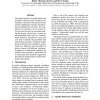Free Online Productivity Tools
i2Speak
i2Symbol
i2OCR
iTex2Img
iWeb2Print
iWeb2Shot
i2Type
iPdf2Split
iPdf2Merge
i2Bopomofo
i2Arabic
i2Style
i2Image
i2PDF
iLatex2Rtf
Sci2ools
SIGDIAL
2010
2010
Parameter estimation for agenda-based user simulation
This paper presents an agenda-based user simulator which has been extended to be trainable on real data with the aim of more closely modelling the complex rational behaviour exhibited by real users. The trainable part is formed by a set of random decision points that may be encountered during the process of receiving a system act and responding with a user act. A samplebased method is presented for using real user data to estimate the parameters that control these decisions. Evaluation results are given both in terms of statistics of generated user behaviour and the quality of policies trained with different simulators. Compared to a handcrafted simulator, the trained system provides a much better fit to corpus data and evaluations suggest that this better fit should result in improved dialogue performance.
Related Content
| Added | 15 Feb 2011 |
| Updated | 15 Feb 2011 |
| Type | Journal |
| Year | 2010 |
| Where | SIGDIAL |
| Authors | Simon Keizer, Milica Gasic, Filip Jurcícek, François Mairesse, Blaise Thomson, Kai Yu, Steve Young |
Comments (0)

